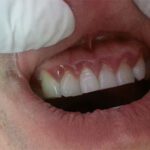If you often see a pink tinge in the sink after you have brushed your teeth, you have bleeding gums. Bleeding gums is an oral problem, it’s a sign of inflammation of the gingiva. Unlike what is said on popular belief, it is not normal. Gingivitis or bleeding gums can be easily corrected. However, it can also be a complication due to more serious health problems like periodontitis (gum infection), diabetes, HIV and other immune-compromised diseases. If you believe it’s because you are not brushing and flossing properly, then do so. But if bleeding still exists more than 2 weeks of proper oral hygiene, or if you have other symptoms like bad breath, then it’s probably something more serious and you need to be checked by your dentist.
Here are some simple ways on how to prevent bleeding gums:

- Brushing your teeth regularly. Brushing is the best way to keep your teeth and gums healthy. It is recommended to brush 2-3 times per day. The toothbrush and the toothpaste are big factors to proper oral care. Choose a toothpaste that contains fluoride. Fluoride gives additional protection to your teeth and gums. Also, use a soft bristled toothbrush. Do a rounding motion instead of back-and-forth. The conventional back-and-forth motion can increase incidence of bleeding gums.
- Don’t forget to floss. Keeping between the teeth as clean as possible makes your gums healthy. It is recommended to floss one time a day, preferably at night. Your dentist will be happy to show you the correct way of flossing.
- Use mouthwash after brushing. You can ask your dentist about an alcohol-free mouthwash with fluoride. Mouthwashes with alcohol can only trigger bleeding gums and dry mouth.
- Brush your tongue. The tongue is a good place for the bacteria to anchor and proliferate. If they became too large in number, they can easily attack the teeth and gums. To get rid of the bacteria, you have to brush your tongue with front-to-back motion using your toothbrush.
- Have a healthy diet. Diet plays a big role in keeping your oral health in top condition. Less sugar and high fiber are the best qualities of food you have to eat. Sugary and starchy food encourages plaque deposits and bacterial attacks on your gums and teeth. Foods rich in Vitamin B and C, as well as calcium are recommended.
Remember, even if you do a good job in your home care, it may not be enough to keep your teeth and gums healthy. You still need to go to your dentist at least twice a year. Nothing will replace a professional dental cleaning. Some plaque are not easily removed just by brushing and flossing. Your dentist will check the condition of your teeth as well as check to see if you have gum disease or periodontal disease by measuring the pockets of the gum. If you do, then he or she will recommend a treatment to treat the disease which may include administration of antibiotics in order to prevent bone loss.
For more information on gum disease or to make an appointment, please call us at (323)771-7254.
By Ladan Zinati

dentures ga
November 11, 2012Perfect just what I was searching for!
admin
November 18, 2012Great, I am glad to be of help.
Elijah
November 28, 2012Very helpful article, i also suffer from such a problem. Does paradontax help in bleeding gum?
admin
November 29, 2012Hi Elijah. Paradonax is a toothpaste, so it’s really not the toothpaste itself that will help with the bleeding gums, but the actual brushing. If you do a proper brushing and flossing, then it really is not that important what type of toothpaste is used. Of course you want a toothpaste that is FDA approved and has fluoride in it. Paradonax is an herbal toothpaste which is good as well. Hope that answers your question.
Howard
November 28, 2012The first 2 to 3 points are very well written and are a great foundation. If a person is dealing with bleeding gums, it’s important to ensure they are brushing with good frequency as well as flossing regularly. Without ensuring gums are strong, more than likely you will experience bleeding at some point.
Point 4 regarding brushing the tongue is somewhat less promoted from my experience, but very important. My current dentist does not promote brushing the tongue, but I have found improvement in my overall mouth health as well as my breathe when I regularly brush my tongue to remove the bacteria.
Point 5 is especially important in my opinion, especially if an individual regularly engages in points 1 thru 4. The foods an individual eats can effect the strength of the teeth and gums, even if the foods are considered healthy. I have always been taught to brush immediately after eating foods that are high in sugar (simple or complex) and especially after highly acidic foods (oranges and pineapples for example).
Overall, great blog. Simple to understand but lays a good foundation that can be actioned by any reader.
admin
November 28, 2012Hi Howard. Yes, you are correct on all points. It’s great that you were taught to take care of your teeth the right way! Keep up the good job!
season three
December 6, 2012very good
Andera Prindiville
December 7, 2012I reckon something really special in this site.